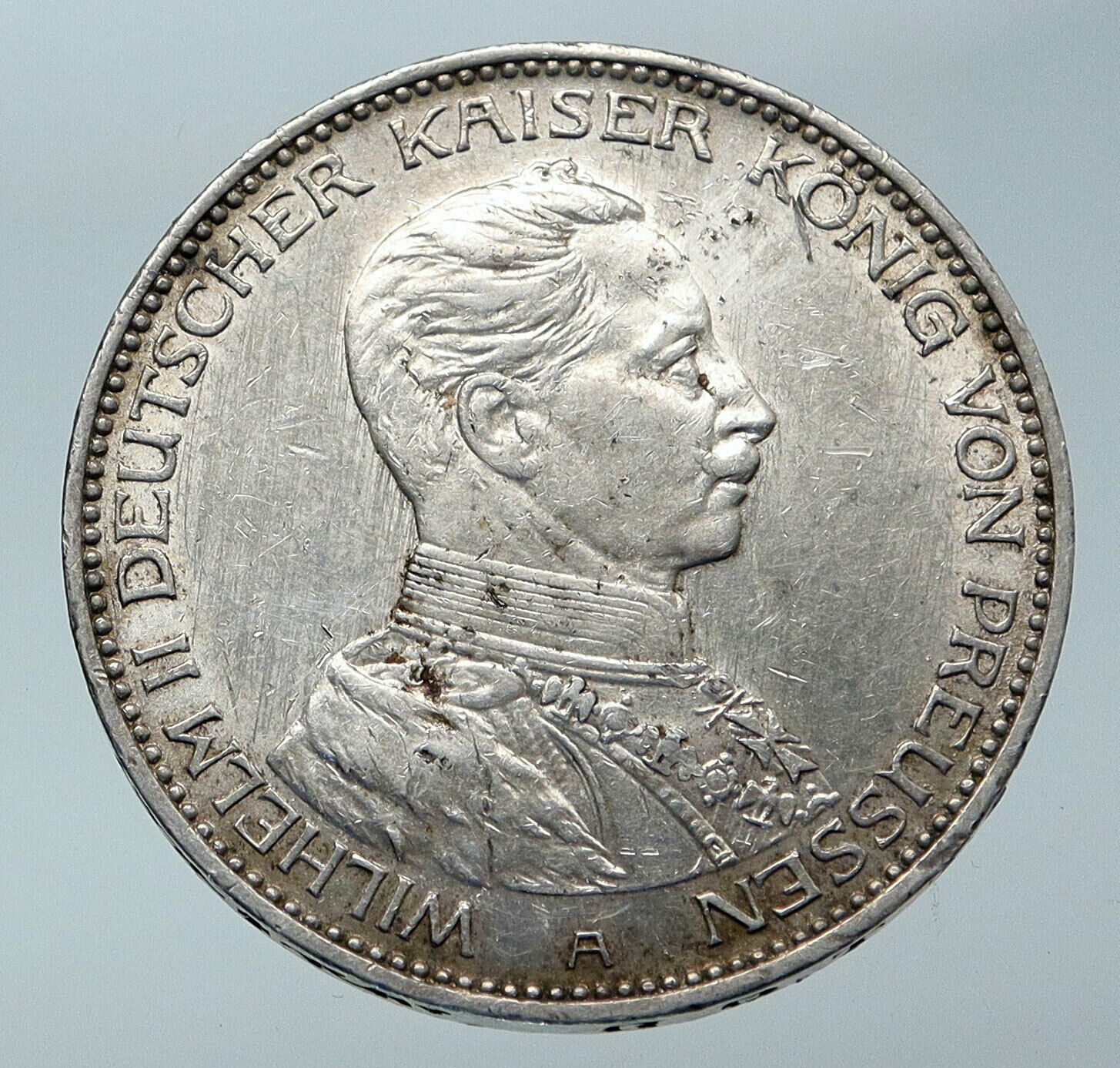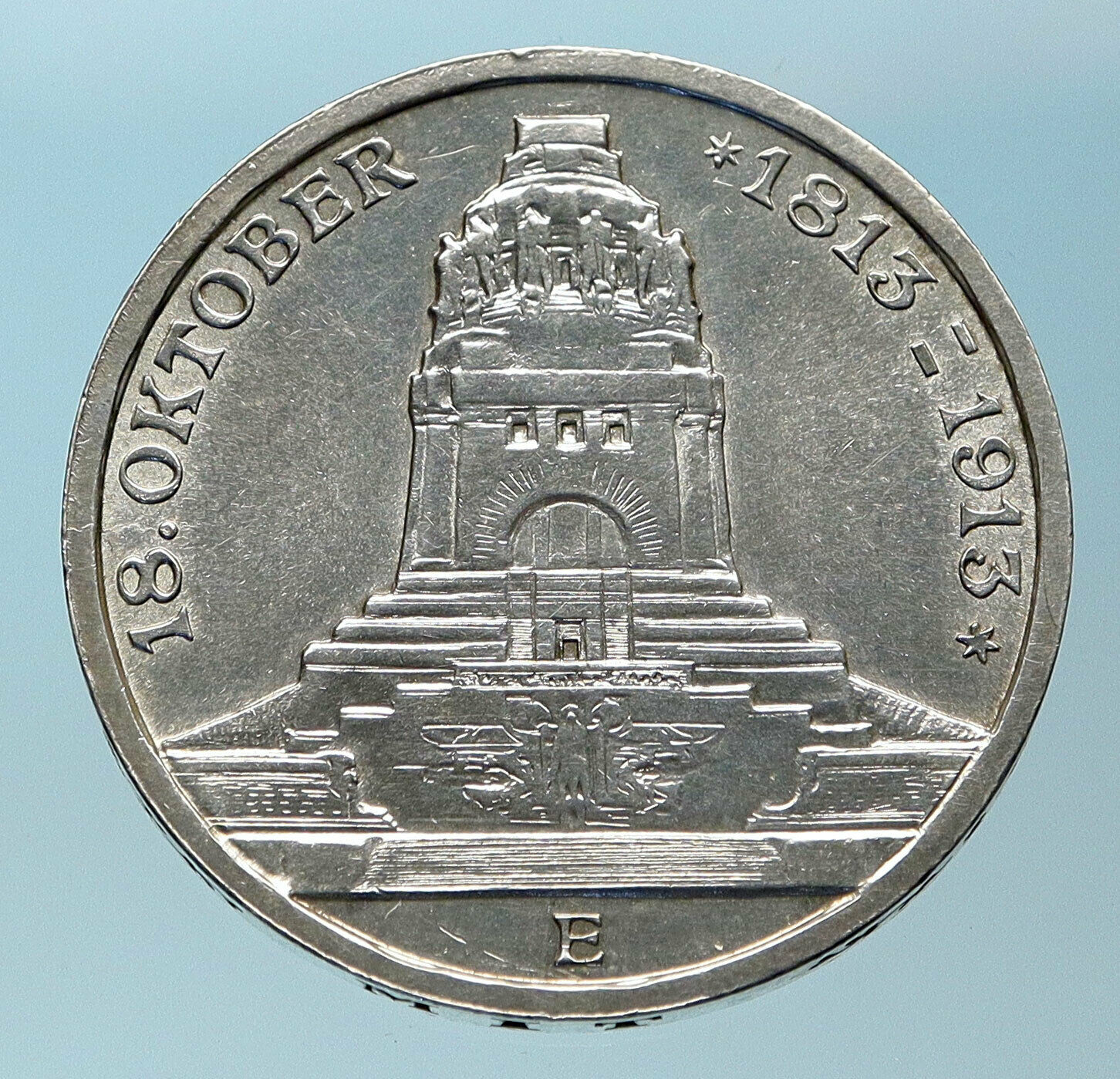|
German States – Anhalt-Dessau under Frederick II – Grand Duke: 28 September 1907 – 22 November 1918
1911 A Silver 3 Mark 27mm (16.60 grams) 0.900 Silver (0.4823 oz. ASW)
Reference: KM# 29, J# 23, AKS# 43
FRIEDRICH II HERZOG VON ANHALT A, Duke Friedrich II. of Anhalt facing left.
* DEUTSCHES REICH 1911 * DREI MARK, Crowned imperial German eagle.
Edge Lettering:
GOTT MIT UNS
Coin Notes:
Anhalt-Dessau was a principality of the Holy Roman Empire and later a duchy of
the German Confederation. Ruled by the House of Ascania, it was created in 1396
following the partition of the Principality of Anhalt-Zerbst, and finally merged
into the re-united Duchy of Anhalt in 1863. The capital of the state was Dessau
in present-day Saxony-Anhalt.
You are bidding on the exact item pictured, provided with a Certificate of Authenticity and Lifetime Guarantee of Authenticity.
 Frederick II (9 July 1857 – 9 August 1928) was the last sovereign Grand Duke of Baden, reigning from 1907 until the abolition of the German monarchies in 1918. The state of Baden originated from the area of the Grand Duchy. In 1951–1952, it became part of the new state of Baden-Württemberg. Frederick II (9 July 1857 – 9 August 1928) was the last sovereign Grand Duke of Baden, reigning from 1907 until the abolition of the German monarchies in 1918. The state of Baden originated from the area of the Grand Duchy. In 1951–1952, it became part of the new state of Baden-Württemberg.
Frederick was born on 9 July 1857, in Karlsruhe in the state of Baden-Württemberg to Frederick I, Grand Duke of Baden and Princess Louise of Prussia.
As a student at the University of Heidelberg, Frederick was a member of the Suevia Corps, a student fraternal organization. Frederick became the head of the House of Zähringen on 28 September 1907, after the death of his father Frederick I, who was the sovereign Grand Duke of Baden reigning from 1856 to 1907. He abdicated on 22 November 1918, amidst the tumults of the German Revolution of 1918–19 which resulted in the abolition of the Grand Duchy. After the death of his cousin Carola of Vasa, he became the representative of the descent of the Kings of Sweden of the House of Holstein-Gottorp. On 20 September 1885 in Schloss Hohenburg, he married Princess Hilda of Nassau, the only daughter of the exiled Duke Adolphe of Nassau who later succeeded as Grand Duke of Luxembourg. There was no surviving issue from the marriage.
He was à la suite the Royal Prussian Regiments Erstes Garde-Regiment zu Fuß (1st Guard Foot Regiment) and 1. Garde-Ulanen-Regiment and à la suite the Imperial 1st Seebataillon.
After his death in 1928, the headship of the house was transferred over to his first cousin who was the last Chancellor of Imperial Germany, Prince Maximilian of Baden.
 Germany, officially the Federal Republic of Germany, officially the Federal Republic of  Germany is a federal parliamentary republic in western-central Europe. It includes 16 constituent states and covers an area of 357,021 square kilometres (137,847 sq mi) with a largely temperate seasonal climate. Its capital and largest city is Berlin. With 81 million inhabitants, Germany is the most populous member state in the European Union. After the United States, it is the second most popular migration destination in the world. Germany is a federal parliamentary republic in western-central Europe. It includes 16 constituent states and covers an area of 357,021 square kilometres (137,847 sq mi) with a largely temperate seasonal climate. Its capital and largest city is Berlin. With 81 million inhabitants, Germany is the most populous member state in the European Union. After the United States, it is the second most popular migration destination in the world.
Various Germanic tribes have occupied northern Germany since classical antiquity. A region named Germania was documented before 100 CE. During the Migration Period the Germanic tribes expanded southward. Beginning in the 10th century, German territories formed a central part of the Holy Roman Empire. During the 16th century, northern German regions became the centre of the Protestant Reformation.
The rise of Pan-Germanism inside the German Confederation resulted in the unification of most of the German states in 1871 into the Prussian-dominated German Empire. After World War I and the German Revolution of 1918-1919, the Empire was replaced by the parliamentary Weimar Republic. The establishment of the Third Reich in 1933 led to World War II and the Holocaust. After 1945, Germany split into two states, East Germany and West Germany. In 1990, the country was reunified.
 In the 21st century, Germany is a great power and has the world’s fourth-largest economy by nominal GDP, as well as the fifth-largest by PPP. As a global leader in several industrial and technological sectors, it is both the world’s third-largest exporter and importer of goods. Germany is a developed country with a very high standard of living sustained by a skilled and productive society. It upholds a social security and universal health care system, environmental protection and a tuition free university education. In the 21st century, Germany is a great power and has the world’s fourth-largest economy by nominal GDP, as well as the fifth-largest by PPP. As a global leader in several industrial and technological sectors, it is both the world’s third-largest exporter and importer of goods. Germany is a developed country with a very high standard of living sustained by a skilled and productive society. It upholds a social security and universal health care system, environmental protection and a tuition free university education.
Germany was a founding member of the European Union in 1993. It is part of the Schengen Area, and became a co-founder of the Eurozone in 1999. Germany is a member of the United Nations, NATO, the G8, the G20, and the OECD. The national military expenditure is the 9th highest in the world. Known for its rich cultural history, Germany has been continuously the home of influential artists, philosophers, musicians, sportsmen, entrepreneurs, scientists and inventors.
|





 Frederick II (9 July 1857 – 9 August 1928) was the last sovereign Grand Duke of Baden, reigning from 1907 until the abolition of the German monarchies in 1918. The state of Baden originated from the area of the Grand Duchy. In 1951–1952, it became part of the new state of Baden-Württemberg.
Frederick II (9 July 1857 – 9 August 1928) was the last sovereign Grand Duke of Baden, reigning from 1907 until the abolition of the German monarchies in 1918. The state of Baden originated from the area of the Grand Duchy. In 1951–1952, it became part of the new state of Baden-Württemberg. Germany, officially the Federal Republic of
Germany, officially the Federal Republic of  Germany is a federal parliamentary republic in western-central Europe. It includes 16 constituent states and covers an area of 357,021 square kilometres (137,847 sq mi) with a largely temperate seasonal climate. Its capital and largest city is Berlin. With 81 million inhabitants, Germany is the most populous member state in the European Union. After the United States, it is the second most popular migration destination in the world.
Germany is a federal parliamentary republic in western-central Europe. It includes 16 constituent states and covers an area of 357,021 square kilometres (137,847 sq mi) with a largely temperate seasonal climate. Its capital and largest city is Berlin. With 81 million inhabitants, Germany is the most populous member state in the European Union. After the United States, it is the second most popular migration destination in the world. In the 21st century, Germany is a great power and has the world’s fourth-largest economy by nominal GDP, as well as the fifth-largest by PPP. As a global leader in several industrial and technological sectors, it is both the world’s third-largest exporter and importer of goods. Germany is a developed country with a very high standard of living sustained by a skilled and productive society. It upholds a social security and universal health care system, environmental protection and a tuition free university education.
In the 21st century, Germany is a great power and has the world’s fourth-largest economy by nominal GDP, as well as the fifth-largest by PPP. As a global leader in several industrial and technological sectors, it is both the world’s third-largest exporter and importer of goods. Germany is a developed country with a very high standard of living sustained by a skilled and productive society. It upholds a social security and universal health care system, environmental protection and a tuition free university education.




